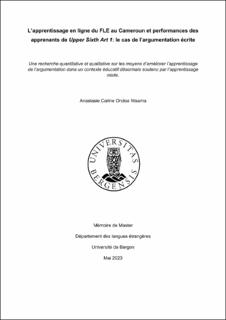| dc.contributor.author | Ondoa Ntsama, Anastasie Carine | |
| dc.date.accessioned | 2023-06-17T00:07:26Z | |
| dc.date.available | 2023-06-17T00:07:26Z | |
| dc.date.issued | 2023-05-15 | |
| dc.date.submitted | 2023-06-16T22:00:45Z | |
| dc.identifier.uri | https://hdl.handle.net/11250/3071886 | |
| dc.description.abstract | The global pandemic of COVID-19 has forced the closure of schools and prompted many governments to deploy strategies to enable continuity of education. In Cameroon, the Ministry of Secondary Education introduced a blended type of e-learning in 2021 by setting up an e-learning scheme called 'Distance Education'. The extent of the resulting decline in academic performance raises questions about the efficiency of this type of e-learning. This study is a reflection on how to improve the written performance of Upper Sixth A1 students in written argumentation in the Cameroonian context of blended e-learning. It examines both the learners' experiences with this learning modality and the factors that influence the learning of argumentation. The answers to these questions constitute ways to identify strategies that will optimize the production of argumentative texts by students. The theory chapter first presents the context of e-learning in Cameroon. It then outlines the key concepts of the study. Finally, it presents the learning theories that underpin this study: Vygotski's socio-constructivist model, which elaborates on the co-construction of knowledge, and Siemens and Downes' connectivism, which is based on the contribution of new technologies to learning. A mixed quantitative and qualitative approach was used to collect and analyze data. In the first method, questionnaires were administered to a sample of 103 Upper Sixth A1 learners and 26 Upper Sixth A1 teachers, in 12 schools in the Centre region of Cameroon. A semi-structured interview was then conducted with a teacher and a structured observation in a class of 21 students. While the majority of respondents agreed that the introduction of e-learning was the solution to the need that arose from the school closure in Cameroon, they felt that they raised a couple of issues with the alternative solution and precisely when it relates to the access to courses and interaction. They cite problems related to time management, limited follow-up possibilities, and teaching methods. There seems, therefore, to be a need to rethink and expand learning platforms so that they are interactive, decentralized, personalized, and accessible to all. | |
| dc.language.iso | fre | |
| dc.publisher | The University of Bergen | |
| dc.rights | Copyright the Author. All rights reserved | |
| dc.subject | le francais langue étrangère | |
| dc.subject | french as a foreign language | |
| dc.subject | online learning | |
| dc.subject | l' apprentissage en ligne | |
| dc.subject | l'argumentation | |
| dc.subject | argumentation | |
| dc.title | L'apprentissage en ligne du FLE au Cameroun et performances des apprenants de Upper Sixth Art1: le cas de l'argumentation écrite | |
| dc.title.alternative | Online learning of french as a foreign language in Cameroon and performance of Upper Sixth Art 1 learners: the case of written argumentation | |
| dc.type | Master thesis | |
| dc.date.updated | 2023-06-16T22:00:45Z | |
| dc.rights.holder | Copyright the Author. All rights reserved | |
| dc.description.degree | French - Master's Thesis | |
| dc.description.localcode | FRAN350 | |
| dc.description.localcode | MAHF-LÆFR | |
| dc.description.localcode | MAHF-FRAN | |
| dc.subject.nus | 711125 | |
| fs.subjectcode | FRAN350 | |
| fs.unitcode | 11-20-0 | |
